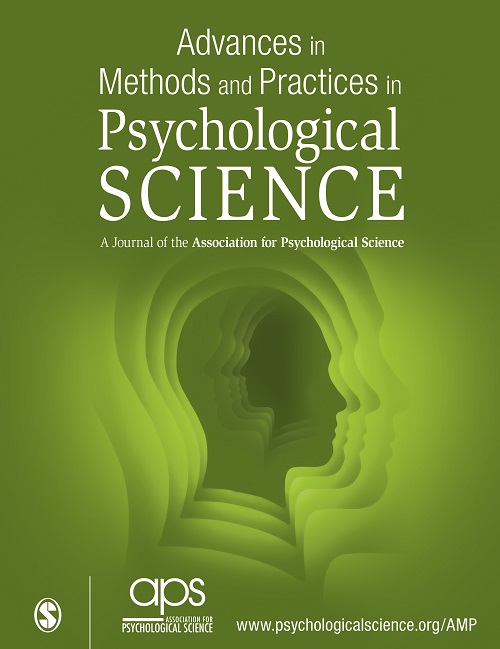Justify Your Alpha: A Primer on Two Practical Approaches
IF 15.6
1区 心理学
Q1 PSYCHOLOGY
Advances in Methods and Practices in Psychological Science
Pub Date : 2021-06-14
DOI:10.1177/25152459221080396
引用次数: 25
Abstract
The default use of an alpha level of .05 is suboptimal for two reasons. First, decisions based on data can be made more efficiently by choosing an alpha level that minimizes the combined Type 1 and Type 2 error rate. Second, it is possible that in studies with very high statistical power, p values lower than the alpha level can be more likely when the null hypothesis is true than when the alternative hypothesis is true (i.e., Lindley’s paradox). In this article, we explain two approaches that can be used to justify a better choice of an alpha level than relying on the default threshold of .05. The first approach is based on the idea to either minimize or balance Type 1 and Type 2 error rates. The second approach lowers the alpha level as a function of the sample size to prevent Lindley’s paradox. An R package and Shiny app are provided to perform the required calculations. Both approaches have their limitations (e.g., the challenge of specifying relative costs and priors) but can offer an improvement to current practices, especially when sample sizes are large. The use of alpha levels that are better justified should improve statistical inferences and can increase the efficiency and informativeness of scientific research.证明你的Alpha:两种实用方法的入门
默认使用0.05的alpha水平是次优的,原因有两个。首先,通过选择一个最小化类型1和类型2错误率的alpha水平,基于数据的决策可以更有效地进行。其次,在具有非常高统计能力的研究中,当零假设为真时,p值低于α水平的可能性比备择假设为真时更大(即林德利悖论)。在本文中,我们解释了两种方法,它们可以用来证明选择α水平比依赖于默认阈值0.05更好。第一种方法基于最小化或平衡类型1和类型2错误率的想法。第二种方法降低alpha水平作为样本大小的函数,以防止林德利悖论。提供了一个R包和Shiny应用程序来执行所需的计算。这两种方法都有其局限性(例如,指定相对成本和先验的挑战),但可以提供对当前实践的改进,特别是在样本量很大的情况下。使用更合理的alpha水平应能改进统计推断,并能提高科学研究的效率和信息量。
本文章由计算机程序翻译,如有差异,请以英文原文为准。
求助全文
约1分钟内获得全文
求助全文
来源期刊
CiteScore
21.20
自引率
0.70%
发文量
16
期刊介绍:
In 2021, Advances in Methods and Practices in Psychological Science will undergo a transition to become an open access journal. This journal focuses on publishing innovative developments in research methods, practices, and conduct within the field of psychological science. It embraces a wide range of areas and topics and encourages the integration of methodological and analytical questions.
The aim of AMPPS is to bring the latest methodological advances to researchers from various disciplines, even those who are not methodological experts. Therefore, the journal seeks submissions that are accessible to readers with different research interests and that represent the diverse research trends within the field of psychological science.
The types of content that AMPPS welcomes include articles that communicate advancements in methods, practices, and metascience, as well as empirical scientific best practices. Additionally, tutorials, commentaries, and simulation studies on new techniques and research tools are encouraged. The journal also aims to publish papers that bring advances from specialized subfields to a broader audience. Lastly, AMPPS accepts Registered Replication Reports, which focus on replicating important findings from previously published studies.
Overall, the transition of Advances in Methods and Practices in Psychological Science to an open access journal aims to increase accessibility and promote the dissemination of new developments in research methods and practices within the field of psychological science.

 求助内容:
求助内容: 应助结果提醒方式:
应助结果提醒方式:


